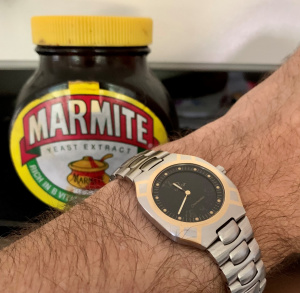Omega Seamaster Polaris
Omega Seamaster Polaris

A true Marmite watch! For those who don't know about Marmite...see below!
Introduction
There are few models that divide opinion amongst collectors quite like the very 1980s Omega Polaris, with its Genta-inspired case and gold inlay, titanium materials and a quartz movement that was the precursor of the X33, with a multi-function display. Polaris or polarisation - it was an apposite choice of name.
With the help of https://eskerahn.dk/?p=3002 we can explore this model in greater detail.
Overview
The Polaris exists with different sizes, calibers and dials, and in different case materials.
There are three sizes: “Ladies”, “Men” and “XL”
These case combinations have been seen:
Titanium with gold inlay Gold with titanium inlays Gold with titanium and diamonds inlays Titanium with palladium inlays Stainless steel with Gold inlays
The backs also vary over time. The early ones with a flat back and the later having a relief Seamaster logo, and some of these with gold medallion. The caseback is held by 4 screws.
The steel/titanium was brushed up, to give it a mate finish, so it can be difficult to distinguish in photos. In the hand the titanium is substantially lighter of course than the steel version.
The bracelet exists in various matching combinations:
Titanium Titanium with solid gold centre-links Gold with titanium centre links Stainless steel Stainless steel with gold capped centre links (With the width matching the case size of course)
The stainless steel+gold bracelet has the centre links with a gold cap similar to the inlay in the case. In the 1987 German price catalogue there is a substantial price difference (1250 vs 2300 DM) and it is (translated) called “…with gold inlays in case and in band” in German “… mit goldintarsien im Gehaüsa und im Band“, so not merely gold plated it is assumed.
The early titanium bands came with the buckle of the Stainless-steel one (note the colour difference of the double link of the clasp), only being given a special buckle in a later generation. Also note the plain back with text on the early one, and the relief on the later.
Movements
The calibers exist in a variety where at least the ‘Olympic’ 1988 Calgary/Seoul one is in the XL edition only, and the lady-size is with plain time and time&date only
Cal. 1665, Multifunction, LCD-display, Early version both grey and black exist. Cal. 1460 Plain time Cal. 1380&1109 Plain time with date at 3-o’clock Cal. 1449 GMT variant with extra 24h hand, and date at 3-o’clock Cal. 1444 Chrono with two small dials for weekday and day Cal. 1675&1154, Chrono with seven hands and two buttons and date at 3-o’clock Cal. 1670 Olympic with seven hands, two LCD-windows and four buttons
Some got the hour dots as florescent lume - probably tritium, and some got diamonds.
